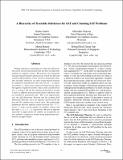A hierarchy of tractable subclasses for SAT and counting SAT problems
Author(s)
Rinard, Martin C.; Grigoras, Gheorghe; Andrei, Stefan; Yap, Roland Hock Chuan
DownloadAndrei-2009-A hierarchy of tractable subclasses for SAT and counting SAT problems.pdf (215.0Kb)
PUBLISHER_POLICY
Publisher Policy
Article is made available in accordance with the publisher's policy and may be subject to US copyright law. Please refer to the publisher's site for terms of use.
Terms of use
Metadata
Show full item recordAbstract
Finding subclasses of formulae for which the SAT problem can be solved in polynomial time has been an important problem in computer science. We present a new hierarchy of propositional formulae subclasses for which the SAT and counting SAT problems can be solved in polynomial time. Our tractable subclasses are those propositional formulae in conjunctive normal form where any set of k + 1 clauses are related, i.e., there exists at least one literal in one clause that appears negated in another clause of the considered set of k + 1 clauses. We say this subclass of formulae is of rank k and it is different from previously known subclasses that are solvable in polynomial time. This is an improvement over the SAT Dichotomy Theorem and the counting SAT Dichotomy Theorem, since our subclass can be moved out from the NP-complete class to the P class. The membership problem for this new subclass can be solved in O(n·l[superscript k+1]), where n, l and k are the number of variables, clauses and the rank (1 [less than and equal to] k [less than and equal to] l - 1), respectively. We give an efficient algorithm to approximate the number of assignments for any arbitrary conjunctive normal form propositional formula by an upper bound.
Date issued
2010-05Department
Massachusetts Institute of Technology. Department of Electrical Engineering and Computer Science; Massachusetts Institute of Technology. Laboratory for Computer ScienceJournal
2009 11th International Symposium on Symbolic and Numeric Algorithms for Scientific Computing (SYNASC)
Publisher
Institute of Electrical and Electronics Engineers
Citation
Andrei, S. et al. “A Hierarchy of Tractable Subclasses for SAT and Counting SAT Problems.” Symbolic and Numeric Algorithms for Scientific Computing (SYNASC), 2009 11th International Symposium on. 2009. 61-68. © 2009 Institute of Electrical and Electronics Engineers.
Version: Final published version
Other identifiers
INSPEC Accession Number: 11304500
ISBN
978-1-4244-5910-0
Keywords
SAT and Counting SAT Problems, Tractable Subclasses